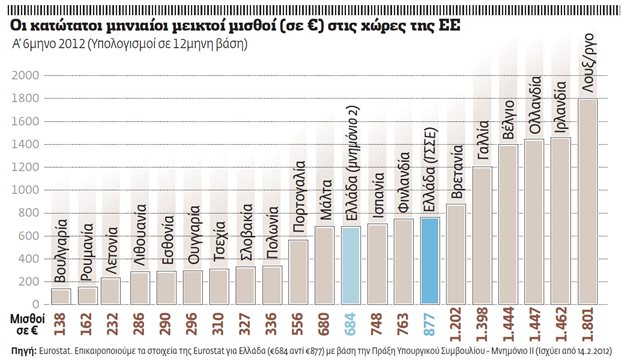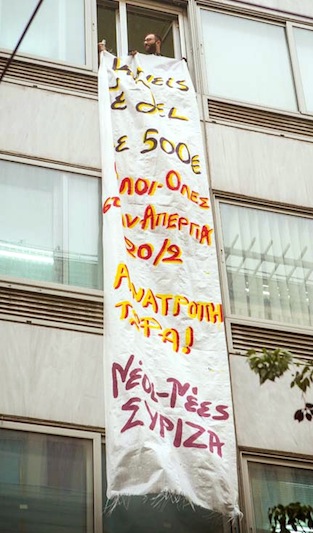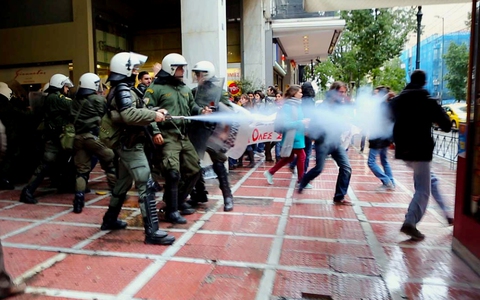Following a series of reductions and changes in labour law, the minimum salary in Greece remains high compared to the average value accepted in the European Union. This short conclusion made by the chief secretary of the Ministry of Finance George Mergos provoked a series of riots, which as it has become usual for Greece ended with clashes with police and tear gas.
A comparison of the minimum salary in 20 European Union countries shows that Greece is somewhere in the middle of the scale of the richest and poorest countries on the continent. Some of the highest minimum salaries have been recorded in Luxembourg (1,801 euro), Ireland (1,462 euro), the Netherlands (1,447 euro) and Belgium (1,444 euro) whereas the lowest monthly salaries are in Bulgaria (138 euro), Romania (162 euro) and Lithuania (232 euro).

According to Eurostat data, the minimum gross monthly salary in Greece in the period following February 2012 was 684 euro. After further adjustments, the minimum salary of citizens over the age of 25 has become 586 euro and 510 euro for young people at the age of up to 25 years.
Since last week, 42 occupations in the field of production, processing and trade have remained without the protection of branch agreements, which according to economists of the trade unions will lead to further reductions in the salaries of workers. There are also concerns that this will collapse completely not only the purchasing power of 600 thousand people, which will exacerbate the ongoing recession, but it will further contribute to widespread poverty in the country.
According to the latest data published by the labour monitoring organisation, the salaries of 412 thousand people were reduced in 2012. 756 enterprises cut the salaries of slightly more than 90 thousand employees by an average of 19%. They signed individual rather than collective agreements, in which both sides agreed on the level of voluntary redundancies. On the same principle, 68 thousand enterprises replaced the collective or branch with individual agreements and imposed reductions of 22.1% on average, which affected 245 thousand people.
In a period of rising unemployment, 44% relate to part-time employment whereas working in the "black" has already been out of control as stated by the supervising authority. Last year, slightly more than 19 thousand companies with a total of 61 thousand employees were inspected, 22 thousand of whom were working without a legal contract and were not paying social security contributions and health insurance. According to the same organization, illegal employment was 25% of the labour market in 2010 whereas its share rose to 36.2% in 2012.
In trying to regain Greece’s competitiveness, the government has undertaken to reduce the average 
 salary to levels closer to declining productivity first in the private and then, in the public sector. At a business conference last week, the chief secretary of the Ministry of Finance George Mergas noted that despite the efforts, labour costs remained high compared with the 27 member states of the European Union.
salary to levels closer to declining productivity first in the private and then, in the public sector. At a business conference last week, the chief secretary of the Ministry of Finance George Mergas noted that despite the efforts, labour costs remained high compared with the 27 member states of the European Union.
A day later, members of the youth organization of SYRIZA occupied the office of the chief secretary in protest against the opinion he had expressed. They broke into his office on Stadiou Street near Syntagma Square without permission. They hung on the facade of the building a poster reading, "Mergos with 6 thousand euro, 586 euro seems a lot to you. You live with it!" and chanted, "No one can live with 500 euro, take your Memorandum and get out of here". After ten minutes of shouting and protesting, they moved to the entrance of the public building where the protest continued.
The police appeared on the scene and dispersed the crowd with tear gas. The acts of SYRIZA’s youths and Mergos’ words caused a serious clash between the government and the opposition in parliament. The spirits were appeased only after Prime Minister Antonis Samaras himself pledged personally and told Realnews that the minimum salary would not be further reduced.
 In the sixth year of economic downturn, the recession is likely to turn into a financial depression as commented by local and foreign experts. Another drastic reduction in salaries could be the spark to ignite much more extreme social collisions from those Greece has faced so far. At the same time, many Greek companies are willing to further reduce all costs (including labour costs) to withstand the increasing tax burden and not to close their businesses. However, the economic development programme of the coalition government will determine the extents to which Samaras’ promise to prevent another reduction in the level of salaries can be kept.
In the sixth year of economic downturn, the recession is likely to turn into a financial depression as commented by local and foreign experts. Another drastic reduction in salaries could be the spark to ignite much more extreme social collisions from those Greece has faced so far. At the same time, many Greek companies are willing to further reduce all costs (including labour costs) to withstand the increasing tax burden and not to close their businesses. However, the economic development programme of the coalition government will determine the extents to which Samaras’ promise to prevent another reduction in the level of salaries can be kept.